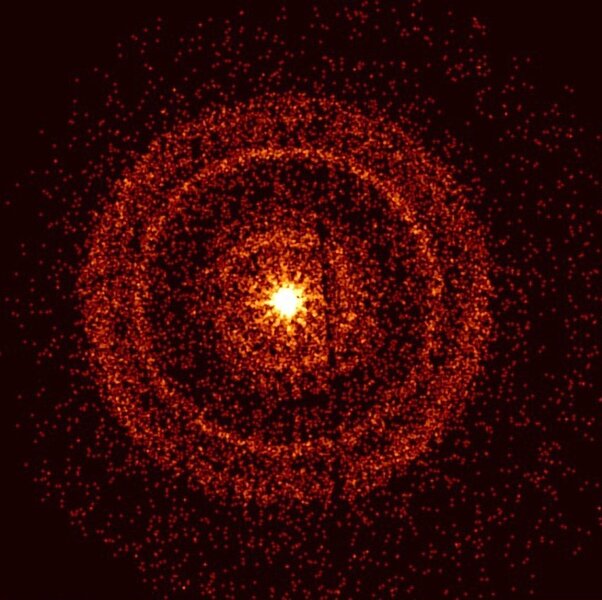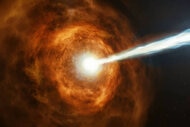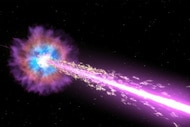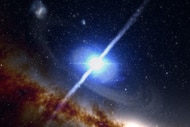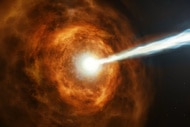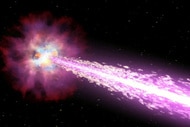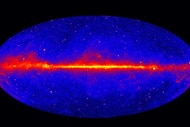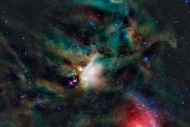Create a free profile to get unlimited access to exclusive videos, sweepstakes, and more!
What Caused the BOAT, the Brightest Gamma Ray Explosion of All Time?
The BOAT is surprisingly normal, and that's weird!
Writer/director Christopher Nolan’s award-winning biopic Oppenheimer tells the story of the program which birthed the atomic bomb and the man who led it. By the time they reached the now-infamous Trinity test, Oppenheimer and company had unleashed the most powerful explosive power of all time. At least, on Earth.
Scattered all over the cosmos, stars have been making use of nuclear power since shortly after the dawn of time. In the heart of every star, a nuclear furnace is fusing hydrogen, helium, or some other light element into a slightly heavier one. In the process, heat and light gets released and the critters crawling along the surfaces of nearby planets feel the gentle caress of starlight.
Eventually, they run out of fusible material and that’s when things get really interesting. The explosions that happen at the end of a star’s life make humanity’s bombs look like overinflated party balloons by comparison. In 2022, astronomers detected an explosion unlike any they’d ever seen before, an incredible gamma ray burst (GRB) so powerful astronomers lovingly call it the BOAT (Brightest of All Time). Now, astronomers have figured out its origin and uncovered some new mysteries.
The Source of the BOAT, the Brightest Gamma Ray Burst of All Time
The BOAT, officially dubbed GRB 221009A, lit up telescopes all over the world on October 9, 2022 after traveling 2 billion light-years across space. The blast was roughly 10 times brighter than any other GRB ever observed, and astronomers estimate that an event of this magnitude happens only once every 10,000 years.
For More on Gamma Ray Bursts:
Earth Hit by Gamma Ray Burst from a Blob at the Center of the Milky Way
What Is Powering the Largest Explosion Since the Big Bang?
A Dying Star Produced the Most Powerful Cosmic Blast We've Ever Seen
The blast itself only lasted a few minutes, but it was so bright that the afterglow obscured astronomers’ ability to study it. Researchers described it as similar to staring directly into a pair of oncoming headlights. They waited six months for it to dim enough to study. Once the light level had come down enough to look at, astronomers found that the BOAT was produced by the collapse and explosion of a massive star. That provided some answers but offered even more questions, according to a paper published in the journal Nature.
“When we confirmed that the GRB was generated by the collapse of a massive star, that gave us the opportunity to test a hypothesis for how some of the heaviest elements in the universe are formed,” said the study’s lead author, Peter Blanchard, in a statement.
Given the power of the GRB associated with the star collapse, astronomers suspected it might have been the sort of stellar furnace that pumps out heavy elements like gold and platinum. But when they looked, using JWST’s Near Infrared Spectrograph, they didn’t find the heavy elements they were looking for. Instead, they found spectrographic signatures for lighter elements like calcium and oxygen which are characteristic of ordinary supernovas.
“If they were correct, the BOAT should have been a goldmine,” said second author Ashley Villar. “It is really striking that we didn’t see any evidence for these heavy elements.” Likewise, the supernova itself wasn’t all that bright. If it weren’t for the BOAT, it might have looked like any other supernova and we wouldn’t be talking about it. That suggests that powerful GRBs like this one aren’t the primary source of heavy element production. While we know that they form during neutron star mergers, those can’t explain the amount of heavy elements in the universe. The hunt for their origin continues, we just need to find the right kind of explosion.
In the meantime, catch Christopher Nolan’s Oppenheimer, streaming now on Peacock!




